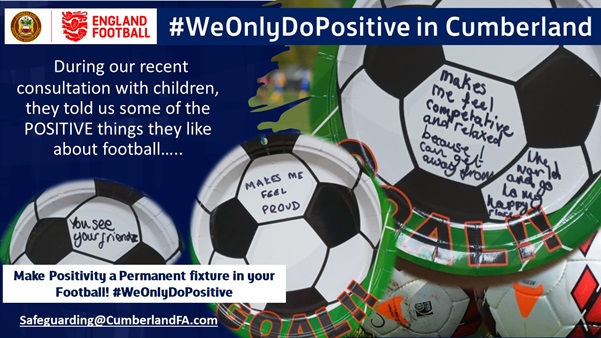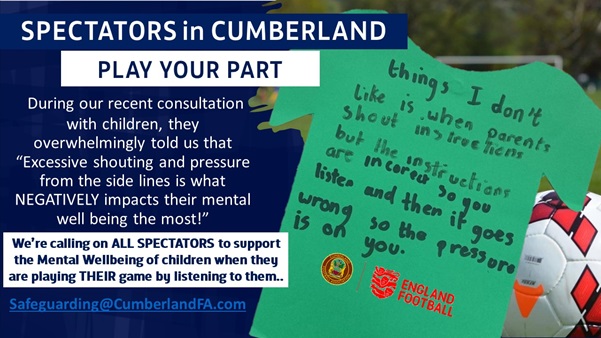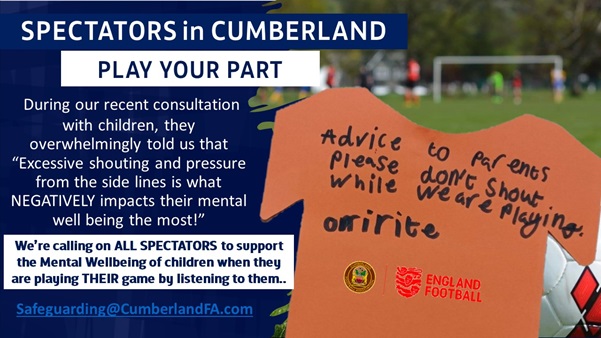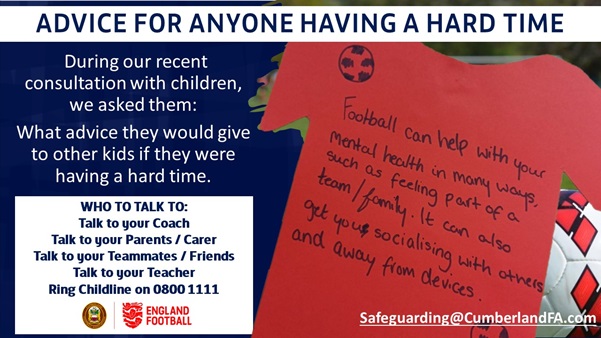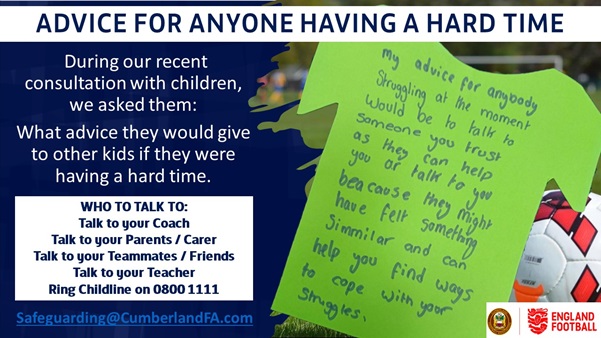
Listening to the Voice of Children
Cumberland FA in partnership with Cumbria County Council, Workington AFC, Every Life Matters and Kooth recently held a consultation event with young Cumberland footballers.
The focus was on ‘Health and Wellbeing’ and how football impacts on the wellbeing of participants (both positively and negatively), with information on how to keep safe, both in and outside football.
80 young footballers from a variety of Clubs were invited to attend and took part in some small-sided games on the Workington AFC pitch while indoor workshop activities were undertaken to capture the voice of young players. A number of young referees were also involved in the event, refereeing and getting involved in the consultation.
During the consultation the young players and referees were asked the following questions and their responses were collated.
1. How does football impact on you positively?
2. How can football negatively affect you?
3. How can we help with this as adults?
4. How might we know if a friend is struggling?
5. Why do people not ask for help?
6. Do you know who to go to with a problem at your club (or outside your club)?
7. Advice for anyone having a hard time
Every Life Matters held a workshop during the day for club’s welfare officers, club volunteers and parents, to educate and inform them on suicide awareness.
THE RESULTS
We collated the responses and found these to be the top 5 responses:
How does football impact on you positively?
1. Gets you fit / healthy
2. Meet new friends
3. Makes me feel proud of myself / to be part of a team
4. Play with my friends
5. Makes me happy
This data clearly shows that ‘winning games’ is not what the children felt was the overriding positive of the game. (4 out of the 80 children cited ‘winning’ as being a way in which football impacts them positively)
How can football negatively affect you?
Top 5 answers:
1. Pressure (general)
2. Negative shouting from spectators
3. Other players being mean
4. Pressure from side lines
5. Getting hurt
Mel Sandwith, Cumberland FA’s Designated Safeguarding Officer, commented that “It was evident from all the answers we collated that the overriding negative impact on children was ‘negative shouting and pressure'. The word ‘pressure’ was used a lot as a negative in different forms but when we asked what kind of pressure, the most common response was from ‘the side-lines’ ie spectators.”
Main Behaviour Negatives of Football were identified as:
1. Negative shouting from spectators
2. Other players being mean
3. Other players having a go at you
4. Coach telling you off for no reason
5. Unsporting behaviour from opponents
How can we help with this as adults?
1. Encouragement and positivity from spectators and coaches
2. Coaches should speak to parents who are shouting (stop parents shouting)
3. Coach sets rules at the start of the game for spectators
4. Remove players from the pitch
5. Coaches should not have favourites
6. Talk to us and help us calm down
The data shows that negative shouting from the side lines is something that children do not want, instead they want encouragement. They also show that they feel it is the coach’s responsibility to support encouragement from the side-lines.
How might we know if a friend is struggling?
1. They are quiet
2. Not their usual self / acting strange or different
3. They are angry
4. Might want to be alone / avoiding people
5. Not playing as well as normal
With more than 20 suggestions of how a child may know if their friend it struggling, it is good to see that children recognise changes in a person’s behaviour is a common sign that someone might have a problem.
Why don't people ask for help?
1. Feel embarrassed / uncomfortable
2. They are scared
3. Don’t want to talk to anyone and keep it to themselves
4. Unsure what happens next
5. Don’t trust people
Do you know who to go to with a problem at your club (or outside your club)?
The children have identified their coach as the person within their club that they would go to for help.
This highlights the importance of coaches having an in-date DBS check and FA Safeguarding qualification in order to be prepared should a child share a safeguarding concern with them.
The majority of responses do show that children know to share their problem with a trusted adult.
Advice for anyone having a hard time
1. Tell a trusted adult / person
2. Talk to someone
3. Keep your head up
4. Stay positive
5. Tell them they are not alone
Mel Sandwith, Cumberland FA’s Designated Safeguarding Officer commented on the event: “Essentially, we wanted young people to be able to benefit from this project by being given the opportunity to influence, feel valued and help shape what is ‘their’ game. The feedback from these sessions was excellent and the children really enjoyed the activities.
During season 2022/23 we aim to work closely with clubs to help them develop a stronger culture of listening.”
As a County FA we want to bring this consultation to life and pass on the findings to the Grassroots Football Community as we head into the new season and encourage enjoyment for all participants (players and referees).
After all the grassroots game in Cumberland will only thrive with children enjoying the game and continuing to turn up each week leading to lifelong participation – with veterans and walking football now available to players of all ages across the county, there is no need to ever retire!


